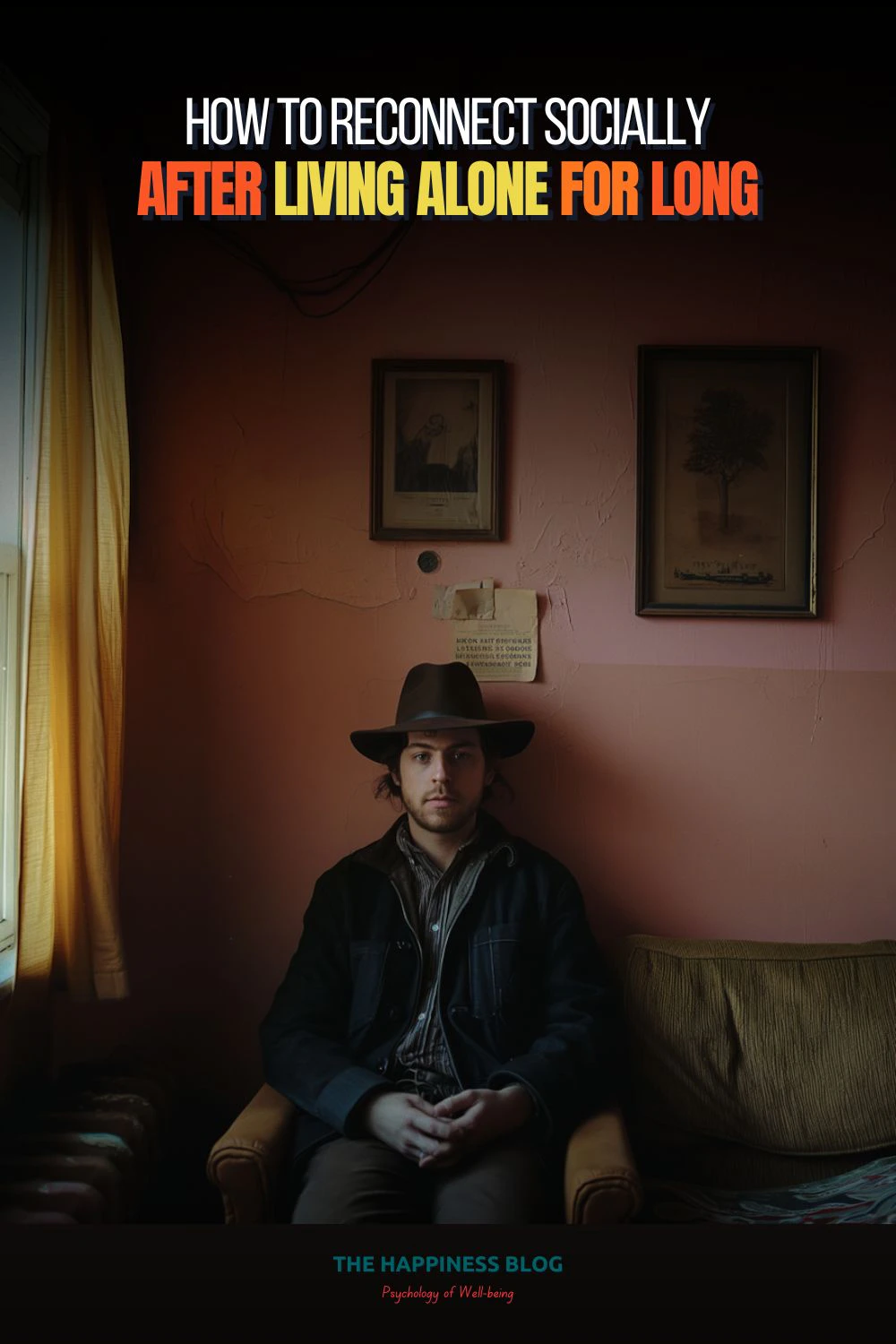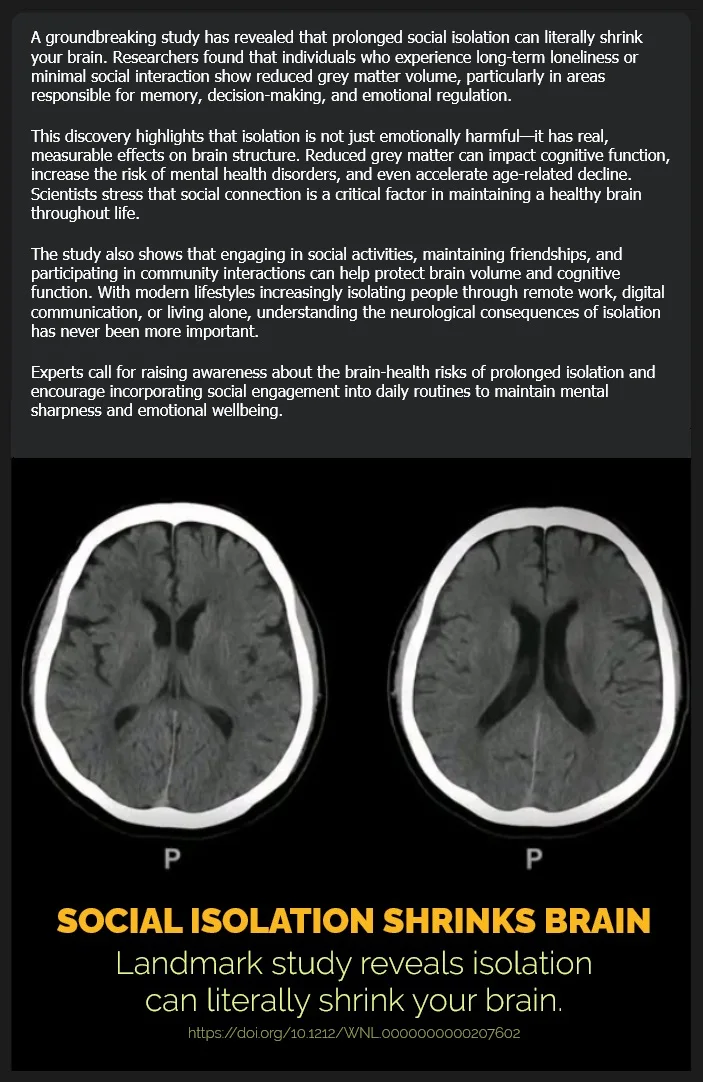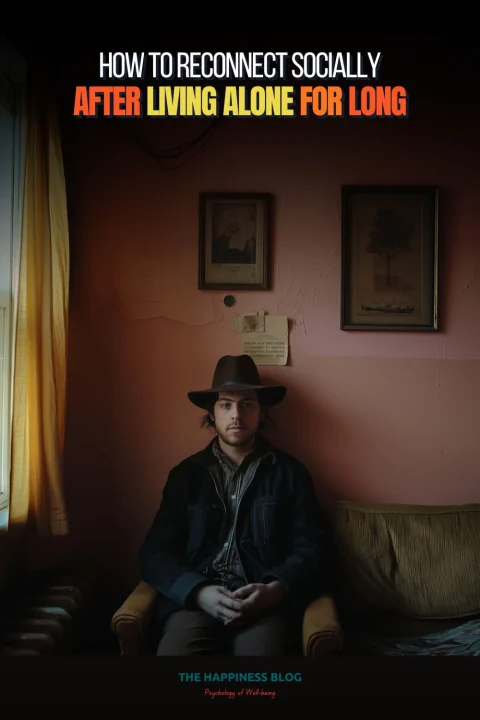Today's Friday • 7 mins read
— By Dr. Sandip Roy.
Loneliness is an emotion that can appear at any time. But it’s more likely to happen when you are living by yourself for a long while.
Research shows living alone or feeling socially cut off can raise blood pressure, stress, and inflammation, while also increasing substance use, poor sleep, low activity, unhealthy eating, and even thoughts of self-injury (Holt-Lunstad, 2021).
Worse, living alone can be a two-way health risk. Social isolation can lead to poor mental health, and poor mental health can make you more likely to withdraw from others.
“Loneliness is a painful personal feeling. It happens when the relationships you have don’t match what you want or need.” — From Loneliness To Social Connection, WHO
So we know the dangers of living alone. But why does it seem so hard to overcome this isolation-created loneliness?
Why Is It Hard To Reconnect After Being Alone For Long?
Being separated from others for months or years can make it difficult to reconnect because:
- You feel safe on your own. You get used to stress-free routines and quiet handling of everything yourself. The comfort of solitude feels safer than the uncertainty of social life.
- You fear judgment by others. You worry about what people will think of you if you share your issue with them. You wonder if they will see your lonely life as a weakness, or ‘creepiness,’ or failure.
- You feel happier in your own space. You get used to doing things for your happiness without asking anyone for permission. The peace of being totally unsupervised is hard to shake off.
- You are fiercely independent. You learned to do everything by yourself, meeting all your needs and fancies by yourself, without any need for assistance or opinion.
- Being alone has become a self-fulfilling prophecy. The more you avoid meeting people, the lonelier you feel. And the more you withdraw, the less joy you find in social interactions. So you prefer to hide in your loneliness instead of reaching out.
So how do you get over the loneliness that grew from it?
How To Overcome Loneliness After Long Periods of Isolation
Here’s what you can do to reconnect socially after a long period of living alone:
1. Decide To Break The Cycle
Few understand how hard it is to come back from long isolation. But unless you make the hard decision to step out of your comfort zone, nothing will change.
Accept that your isolation has become a habit of comfort. Breaking it will take strong intention and decisive action.
To feel less afraid, tell yourself you are not overturning your whole life. You have just committed to one small action a day: saying hello to a neighbor, sending a text to an old friend, or sitting in a café.
As Brené Brown, author of Daring Greatly, says:
In everything that we do, fear and criticism will always be there to greet us. Fear is the great restrictive force, as it stops most people from ever stepping more than one foot outside their comfort zone towards realizing their true desires.
Because fear and criticism will always be there in some form, the best course of action is always to show up anyway and move forward. No matter what you’re doing, show up every day to do what you were meant to do, and don’t let these hindrances stop you.

2. Reenter the World Gradually
Start with public spaces that feel safe and low-pressure. Go for a walk in a park, visit a library, or browse a local market. Be around people without the demand to interact.
When ready, try light conversation: a thank-you, a smile, or a short chat.
3. Challenge Lonely Thoughts
Loneliness often comes with distorted thinking: They don’t want to hear from me, or I’ll make it awkward.
Question those thoughts. Ask what real evidence supports them.
Questions To Challenge Lonely Thoughts
When negative thoughts tell you that people don’t care or that you’ll only make things awkward, pause and check the facts. Ask yourself:
- What proof do I have that they don’t want to hear from me?
- Have they ever said that, or am I assuming it?
- When was the last time I reached out, and how did they respond?
- Could their silence mean they’re just busy or distracted?
- What’s the worst that could happen if I reach out? Could I handle it?
- What’s the best that could happen?
- Am I treating a feeling as a fact?
- How would I respond if a friend said this about themselves?
- What’s a more balanced way to look at this?
Thoughts aren’t always facts. Checking them in real time helps stop loneliness from turning into avoidance.
Cognitive-behavioral techniques (CBT) can retrain your mind to interpret social experiences more accurately and kindly.
4. Volunteer or Help Someone
Helping others gives structure and purpose while reconnecting you with community.
Volunteer at a food bank, animal shelter, or local event. Acts of service pull focus away from self-conscious thoughts and build natural relationships.

5. Practice Mindfulness
Being alone makes you think more about yourself (self-focused rumination). Mindfulness helps you notice these thoughts without letting them overwhelm you.
Studies show mindfulness programs can significantly reduce loneliness within weeks.
In one study, a two-week smartphone mindfulness program cut loneliness by 22% and increased daily social contact (Lindsay, Young, & Brown, 2019). That meant about two more social interactions with one extra person each day.
Use a mindfulness app, guided meditation, or simple breathing. Daily mindfulness can also help ease your loneliness-related anxiety and improve emotional regulation.
Try this 10-minute mindfulness: 7-Step Beginner Guide To Mindfulness Meditation.
6. Set Small Connection Goals
Create one achievable goal each week: message a friend, attend a meetup, or join a local hobby group. Break tasks into small steps.
If a phone call feels hard, start with a text. Call a friend to talk for just 15 seconds.
If social gatherings drain you, commit to staying for twenty minutes, no more.
7. Rebuild One Relationship at a Time
Focus on quality, not quantity. Reach out to one person you miss.
You don’t need an explanation, just a simple message like, “Been thinking of you. How are things?” Consistent, honest contact strengthens bonds and rebuilds trust in others.
8. Use Community Spaces
Public environments such as parks, libraries, and cafés create soft social contact.
Join group activities, like a class, book club, or walking group. It can help ease you back into shared experiences without pressure.
Final Words
Loneliness changes how you think, feel, and connect, but it doesn’t have to define the future you.
Did you know that isolation can shrink your brain?
This study on 8,896 people found that social isolation is linked to lower brain volume, particularly in areas that handle memory and dementia. It gets harder for you to remember things and do things that require brainpower.

Make a bold move to reconnect with others. It’s less about finding “your kind of people” right away and more about relearning the rhythm of human contact.
Quick Actions To Try This Week:
- Text one person you miss.
- Plan one short public outing.
- Do 10 minutes of mindfulness meditation.
- Explore one volunteering opportunity near you.
- Challenge one negative thought about reaching out.
• • •
√ Also Read: Autophobia: How To Overcome The Fear of Loneliness?
√ Please share this if you found it helpful.
» You deserve happiness! Choosing therapy could be your best decision.
...
• Disclosure: Buying via our links earns us a small commission.
